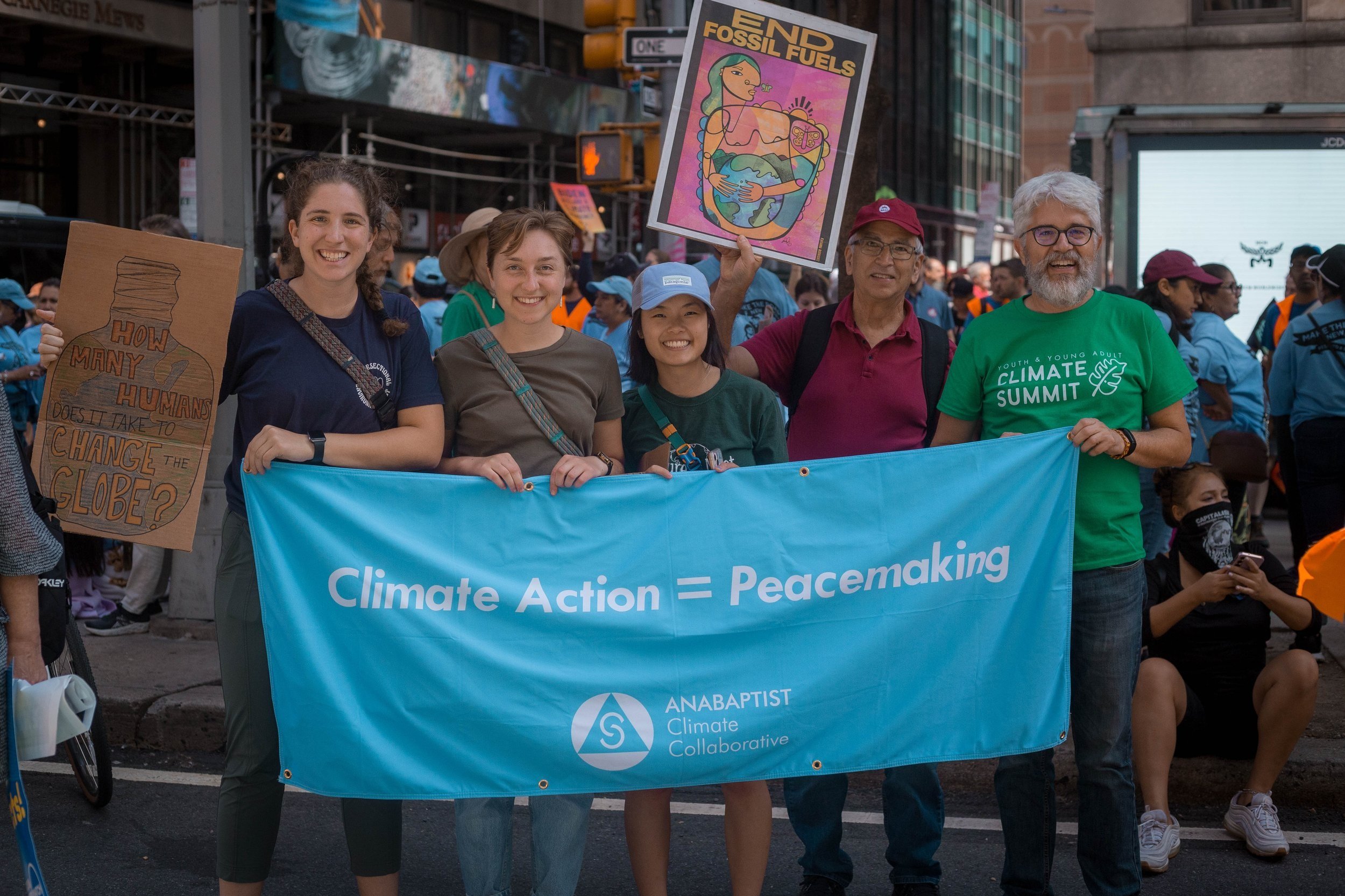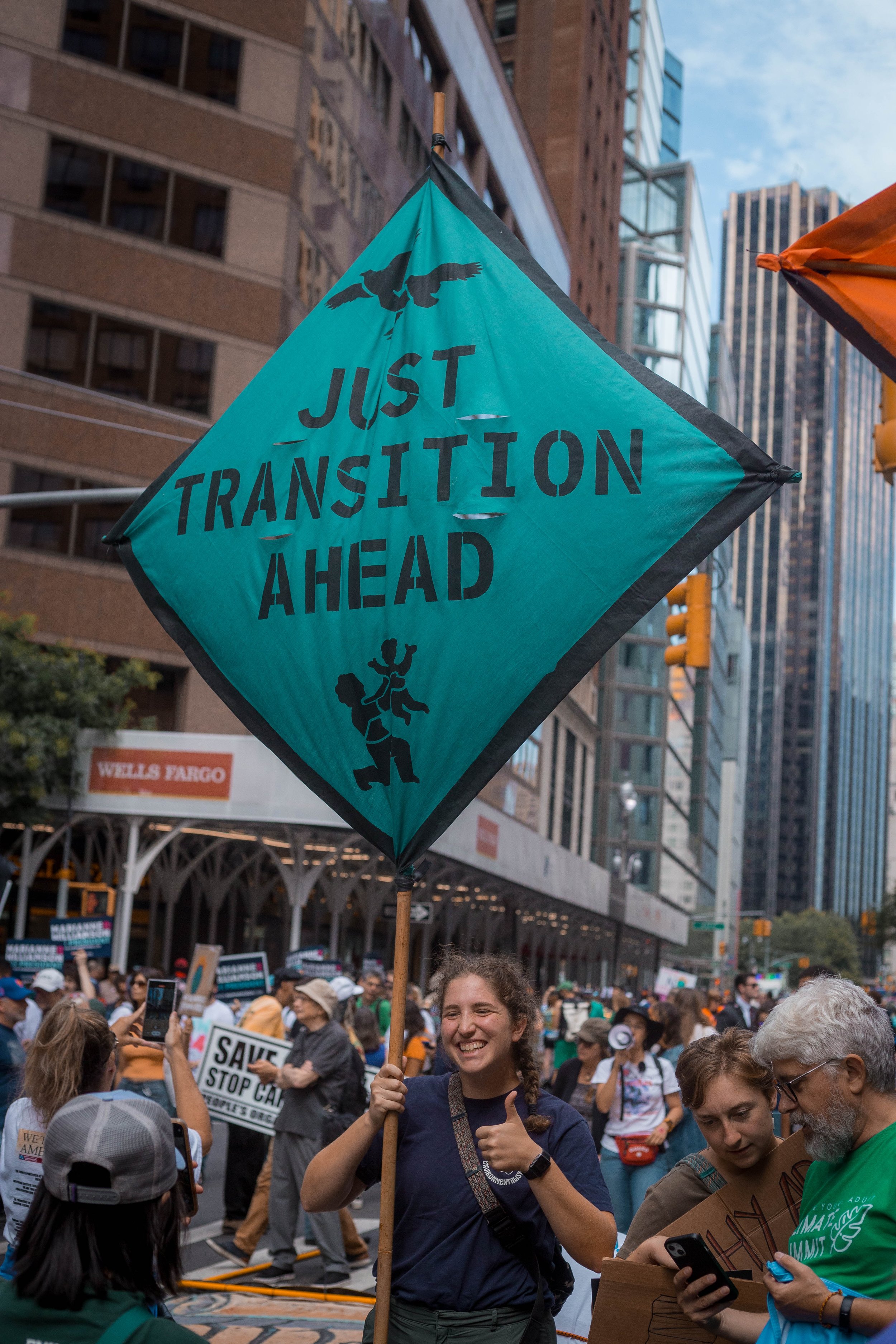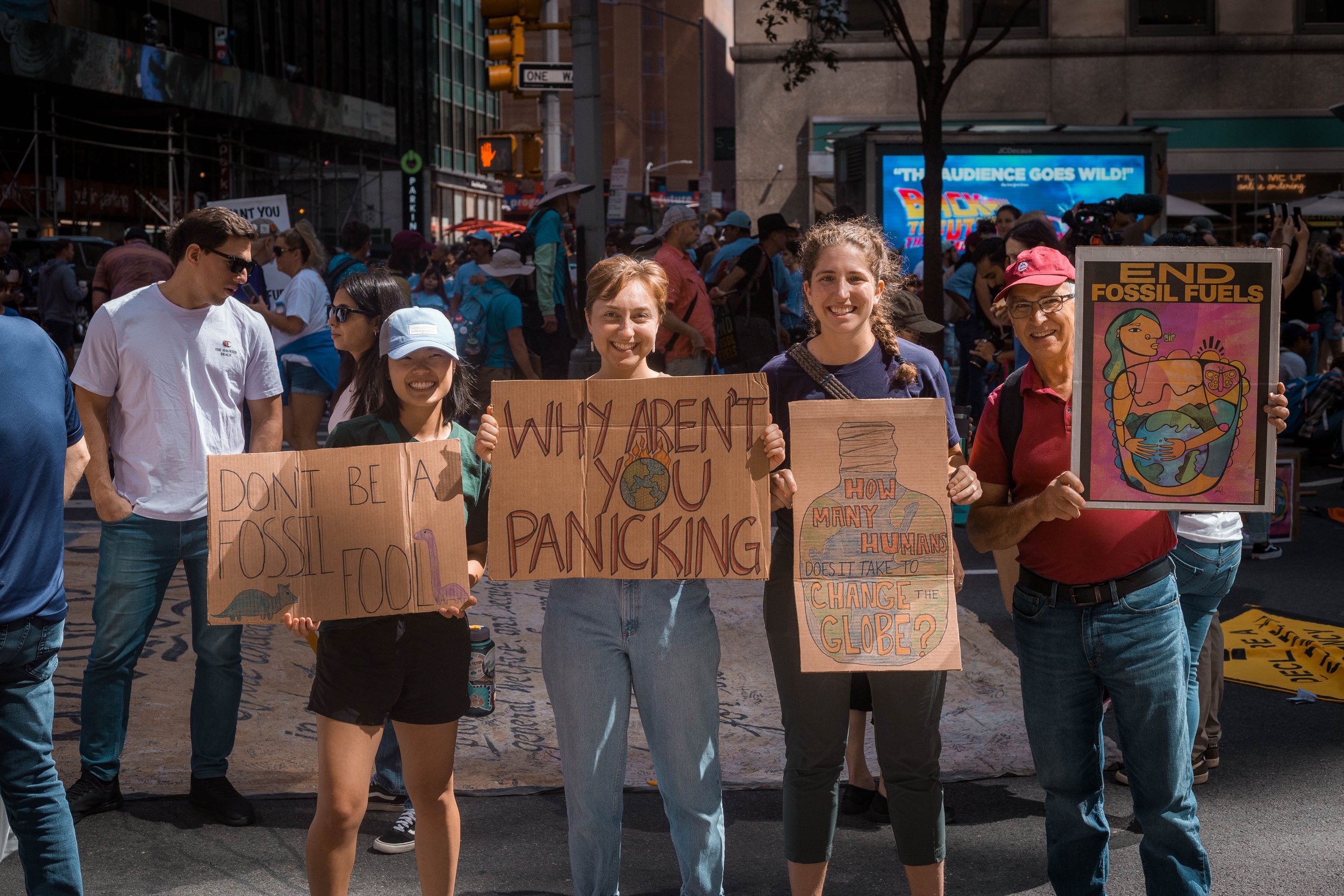October 2023 Blog
ACC gathered students, alumni, and community members to join the March to End Fossil Fuels in New York City on September 17, 2023.
Have hope, not too much, mostly in plants
Director’s Note
When it comes to climate change, hope is complicated. A Marshallese man told me about a conversation with his priest. The Marshall Islands is the most contaminated place on the globe because of 67 nuclear tests by the US military. Now the islands are being submerged in the ocean. Yet his priest told him that God would not allow the islands to disappear.
Usually I hear this from Americans who don’t want to change our fossil fueled lifestyle. Americans have contributed more to global warming than any other nation and so denying it protects us from responsibility and guilt. But this was coming from someone denying his victimhood.
This is a false hope. There is uncertainty around climate change. Global warming from greenhouse gas emissions is a human caused problem. The Biblical prophets teach us not to expect God to rescue us from the natural consequences of our actions.
On the other side of this false hope is climate doom, the theme of this year’s Rooted and Grounded: A Conference on Land and Discipleship. ACC was glad to co-sponsor this event with host Anabaptist Mennonite Biblical Seminary. Climate doom says we have already blown it on climate change so we might as well not do much about it.
While these approaches seem the opposite of each other, they have this danger in common: passivity. We can’t do much about it.
We are causing the problem and we can do something about it. The solutions are available. Buying electric cars and installing solar panels is a start, but we need to work together to bring our carbon emissions down. And we can help those most affected by climate change like those in the Marshall Islands.
I call myself hopeful about climate change rather than optimistic. What’s the difference? Optimism says it’s all up to us; we just need to grit our teeth and make the needed changes. Hope follows God’s life creating and sustaining presence in the world. Soil scientist Rattan Lal once called the soil the place where resurrection happens all the time; death becomes life.
This connects with the gospel of all creatures from early Anabaptist mystic Hans Hut, who saw all creatures as “members of Christ.” Christ is present with all creatures in their suffering, especially with creatures when they sacrifice their lives for others. We too must become more like Christ, leaving behind selfish pursuits so that all creation can thrive. I find hope in the Spirit of life working in creation. Creation herself is renewing and our work is to cooperate.
So I was caught with someone’s adaptation of food journalist Michael Pollan’s food rules: Eat food, not too much, mostly plants. Have hope, not too much, mostly in plants. We have our work to do; we also are on a planet where life thrives. Let us work together with Creator and Creation!
Rooted & Grounded
Emerging Leaders
ACC staff and student ambassadors gathered the last weekend of September for the Rooted & Grounded: A Conference on Land and Discipleship, hosted by Anabaptist Mennonite Biblical Seminary, in Elkhart Indiana. The conference, with a theme this year focused on resiliency in faith-based climate work, provided myriad workshops and presentations focused on various aspects of Anabaptist relationship to the climate crisis, along with space for attendees to reflect on their own experience and understanding of resilience in the climate space.
ACC brought our Campus Climate Ambassadors to the conference, supported by a grant from the Marpeck Fund. ACC has student ambassadors at Anabaptist college campuses throughout the US and Canada working to kickstart climate action on their respective campuses. The gathering at Rooted & Grounded served as the ambassador’s training for the year, providing a space for them to get to know each other and explore ideas regarding effective climate action. Four ambassadors attended the conference. Ambassadors also convened with other student groups, including a group from Canadian Mennonite University.
The conference was kicked off with a keynote address by Kaitlin Curtice, a Potawatomi Christian author and speaker. Curtice emphasized the value of indigenous perspectives in our work toward climate justice, along with highlighting the importance of personal and communal resistance to climate ‘doom.’ Other highlights of the conference included a workshop on personal resilience led by Leah Thomas, Assistant Professor of Pastoral Care at AMBS, immersion experiences that allowed conference attendees to get to know the context of their place in Elkhart from various perspectives, such as commemorating a major indigenous trail that runs through the AMBS campus or an exploration of creative agricultural projects in the area.
Douglas Day Kaufman, Executive Director of ACC, and Joseph Harder, ACC Program Assistant, both presented papers at the conference. Doug’s paper, titled “Grounded Hope amidst Climate Doom,” explored questions of appropriate ways of engaging hope while confronting the climate crisis, and Joseph’s paper, titled “Towards a Mennonite Eco-Hymnody,” was a culmination of his Climate Futures Fellowship centered around exploring the ways the natural world has been depicted in English-language U.S. Mennonite hymnals of the past 120 years.
Following the conference, ACC teamed with the Sustainability Alumni Network (SAN) to gather the ambassadors and other students attending the conference with recent college grads engaged in climate work. This group, numbering six students and seven alumni, convened at Goshen College’s Merry Lea Environmental Learning Center for a retreat providing space for processing of the events of the conference, continued community-building, and space to think and explore the woods and wetlands surrounding the campus.
The events of the weekend – both Rooted & Grounded and the SAN gathering that followed it – proved to be meaningful and invigorating experiences for those that attended, serving as a reminder of the massive value of community and discourse as we work to make a positive difference in the world. We look forward to seeing the work this year’s Campus Climate Ambassador cohort does on their campus, and excitedly anticipate continued involvement in Rooted & Grounded gatherings in years to come.
March to End Fossil Fuels
Building Networks









On September 17, 2023, the Anabaptist Climate Collaborative gathered with over 75,000 others in New York City to participate in a march advocating for world leaders to pivot away from fossil fuel extraction and use. The march, labeled as the March to End Fossil Fuels, took place three days before the United Nations' Climate Ambition Summit, which focused upon issues of integrity, accountability and implementation of climate projects and policy on a global scale.
ACC organized a group of nine people, comprised of staff, current and recent students, and community members to travel and march together. The group ranged in age from 10 to 70 years old.
The march started near the southwestern corner of Central Park, then marched roughly a mile and a half to the United Nations Headquarters, where marchers stopped and listened to speakers and musicians.
Want to learn more about the march? Read the New York Times write-up on the event.
Climate Pollinator Webinar Series
Empowering Diverse Voices
You are invited! Join us for Climate Pollinators, a webinar series on creation care.
This webinar is jointly organized by the Creation Care Task Force and Anabaptist Climate Collaborative.
In these webinars, MWC’s Creation Care Task Force members from each region will host one hour of storytelling and Q&A. Church members from around the world will share how they are affected by climate change – and responding with resilient action and gospel hope.
Next week’s MWC webinar will be hosted by Dr. Sibonokuhle Ncube, a member of the ACC board.
A Word on Generosity
Fundraiser’s Note
There is a fascinating discussion in philosophical circles that is called the “principle of the one and the many”. Simply put, this principle is about finding principles that bring unity in the midst of the diversity that surrounds us. This particular principle attempts to make sense out of the world around us.
I think the “principle of the one and the many:” can also speak to the nature of human beings. We are not all the same, but we are all connected to one another, just as we are connected to the flora and fauna that surrounds us. Some human beings are innovative in their thinking and are leaders. Some are willing followers and doers. And the world needs both kinds.
The Anabaptist Climate Collaborative began when one creative and generous person had an idea that people of Anabaptist faith would care about climate change and want to do something about it. He was willing to generously support our work for the first six years of our existence as the Center for Sustainable Climate Solutions. The one had acted for the many.
We are now in a new era, as we move to embrace our work as a separate 501c3 organization. We invite you now to help us move from the one to the many, as you offer your financial support for our vital work in the Anabaptist community and beyond. We need seek the support of the many, both to honor the generosity of the one and to be part of a larger work to create unity, in the midst of diversity, when it comes to positively impacting climate change.
Look for upcoming communications from us about the new direction and programs we will be taking with our work and how you might be able to join us in that work. Most especially, we hope you will consider making a 2-3 year financial commitment to help us assure we can achieve our goals and grow our donor base. Thank you in advance for your generosity.



